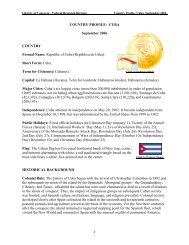1 - American Memory
1 - American Memory
1 - American Memory
You also want an ePaper? Increase the reach of your titles
YUMPU automatically turns print PDFs into web optimized ePapers that Google loves.
907<br />
work. On January 17,1972, the strike was resumed after expiration of<br />
the 80-day cooling-off period and after failure to reach a new contract.<br />
This walkout continued for 34 days. On October 8, 1972, a Hawaiian<br />
ITJA^TJ unit of maintenance, container freight and security workers<br />
struck after failing to get a new contract and were out 59 hours. On<br />
October 25. 1972, the Masters, Mates and Pilots Union struck the<br />
Pacific Maritime Association. This strike lasted 41 days. And on<br />
December 5, 1972, the same union halted operations of Seatrain Lines<br />
California in Oakland and ordered picketing of the company's ships<br />
in Hawaii.<br />
The possibility of further strikes is also very imminent. On July 1,<br />
1975. there will be another contract reopening on both the west coast<br />
and Hawaii docks and current signs give no indication that Hawaii<br />
will not experience another shipping interruption.<br />
With the exception of the two-day local dispute these interruptions<br />
were entirely outside of Hawaii's jurisdiction. Shipping to Hawaii<br />
was curtailed by longshore and maritime disputes on the mainland.<br />
Needless to say, sjich interruptions have had an adverse effect on our<br />
total economy. It is ironic that such interruptions do not affect the<br />
mainland States as much as they do Hawaii, which depends so<br />
heavily on ocean shipping for our people's basic needs. This is not to<br />
overlook the economic effects on the export businesses on the mainland,<br />
including the inland farmers who need to have their products moved<br />
to overseas consumers to continue viable operations. The important<br />
point is that basic mainland supplies to Hawaii are put off whenever<br />
a maritime dispute occurs on the west coast.<br />
The effects and impact of these strikes, besides causing specific hard-<br />
ships to both labor and management, have extended to tnird parties<br />
including the entire population and business community of the State<br />
and have included among other factors—higher consumer prices, lack<br />
of supplies, uncertain markets, unemployment, business failures and<br />
loss of output. During the 1971 strike Hawaii's ex*onomy suffered a<br />
$153.6 million loss of output and a 2.36-percent increase in prices.<br />
In examining the impact of 1971's strikes, we find that the economy<br />
weathered the interniptions only because it was in good shape when<br />
the strike began. The strike did result in increased unemployment and<br />
prices. It did produce slowdowns in industries where there were short-<br />
ages of key supplies or it was not possible to import or export by air.<br />
Many small businesses that did not or could not air cargo were par-<br />
ticularly hard hit.<br />
In the case of sugar, pineapple, and diversified agriculture, the op-<br />
portunity to switch from suriace-to-air cargo was unavailable because<br />
of the cost factors involved. Firms in both industries had difficulty<br />
in getting their products to the mainland. The volume of raw sugar<br />
producea was greater than that of the previous year. Unfortunately,<br />
the dock strike prevented most of the raw sugar produced after July<br />
from reaching t)ie Crockett refinery with the result that it had to be<br />
shut down for a time during the strike.<br />
The pineapple industry was also adversely affected. The dock strike<br />
came during the peak canning season and the industry was unable<br />
to ship its products to the mainland markets until October. Thus,<br />
most of the production for the year had to be stored in Hawaii for a<br />
couple of months, at additional cost of pineapple firms.



![Albert Einstein Papers [finding aid]. Library of Congress. [PDF ...](https://img.yumpu.com/21604228/1/190x245/albert-einstein-papers-finding-aid-library-of-congress-pdf-.jpg?quality=85)





![American Colony in Jerusalem Collection [finding aid]. Library of ...](https://img.yumpu.com/17941275/1/190x245/american-colony-in-jerusalem-collection-finding-aid-library-of-.jpg?quality=85)



![Piccard Family Papers [finding aid]. - American Memory - Library of ...](https://img.yumpu.com/17941234/1/190x245/piccard-family-papers-finding-aid-american-memory-library-of-.jpg?quality=85)


